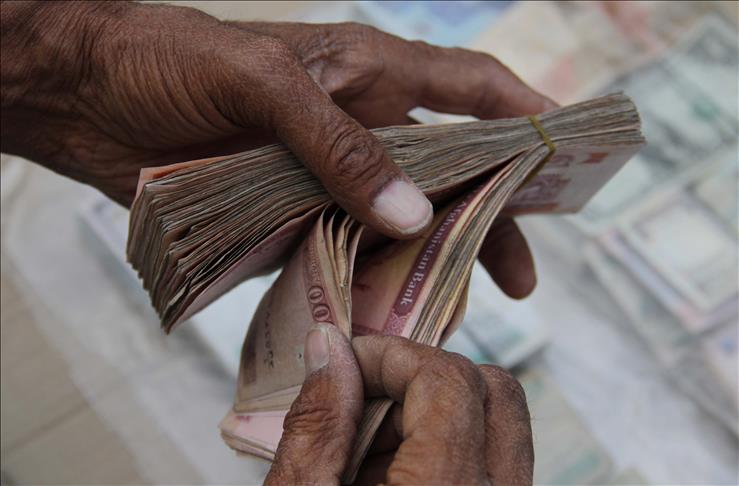
By Andrew Jay Rosenbaum
ANKARA
More than a year of political and security uncertainties coupled with fiscal and banking vulnerabilities have been dogging the Afghanistan economy, according to economists.
Afghanistan's previous period of strong growth since the toppling of the Taliban regime in 2001 appeared to tail off in 2014, a year when foreign troops wound down their combat operations and Afghanistan completed its first democratic handover of power.
According to an International Monetary Fund (IMF) report released Tuesday, economic growth in Afghanistan dropped markedly to 1.5 percent in 2014, from 3.7 a year earlier.
Inflation, private consumption and investment also declined while agricultural production remained similar to the bumper crop of 2012 and eight of the country's banks were declared "weak."
These indications of economic decline reported by the IMF, as well as in an Asian Development Bank (ADB) report in May, show an economy that is suffering from insufficient policy responses.
"The withdrawal of international troops, the prolonged political transition, and inadequate policy response resulted in lower economic confidence and activity," the IMF report said.
"The presidential elections were completed in late-September, with the inauguration of President [Ashraf] Ghani and Chief Executive [Abdullah] Abdullah, but formation of the new government was prolonged and a central bank governor has not been confirmed," the report noted.
The election process began in April 2014 but was drawn out by disputes over electoral fraud in the second-round run-off, leading to a national unity government which itself then faced problems in forming a cabinet.
Ghani took 100 days to agree with Abdullah on a list of ministerial candidates, only for Afghan parliament to reject the majority of names.
An increasingly violent Taliban insurgency has also been highlighted as a cause for reduced investment, with the Taliban launching a stronger drive against remaining international forces and attempting to gain a military advantage that could be used in peace negotiations with the government.
According to a report released Wednesday by the U.S.-based Brown University, titled Costs of War, almost 100,000 people have been killed since U.S.-led forces ousted the Taliban regime in 2001.
Most worrying for the Afghanistan economy is the government's inability to collect sufficient taxes.
"Fiscal policy came under immense pressure in 2014 when domestic revenue fell short of target by a large margin equal to $527 million. Revenues amounted to only AF99.3 billion ($1.9 billion), far below the budgeted target of AF128.8 billion ($2.1 billion)," according to the ADB report.
It highlighted that development partners had only funded $118 million of the shortfall, "leaving the government to finance the difference by drawing down Treasury cash reserves. Domestic revenue financed only 43.9 percent of the operating expenditures, 11.6 percent less than in 2013."
While private consumption was the main driver of economic growth, uncertainty caused by the war and income lost in the retrenchment of spending by security forces pressured it down by nearly half, according to the ADB report.
Investment decreased, with the number of newly registered firms falling to 2,086 from 3,895 in 2013. These figures include the registrations of foreign firms, which halved to 98 from 193, the report said.
Two of the country's banks are dangerously weak, the IMF said. The remaining six are in poor condition.
"Banking sector vulnerability increased because of lax enforcement and delays in financial sector reforms," the IMF said.
The main sustaining factor for the economy, apart from international aid, is opium production, which increased by 17 percent in 2014, according to the UN Office on Drugs and Crime.
Valued at $850 million, it is equal to about 4 percent of the country's GDP -- although it is not counted in compiling GDP figures -- but the value of opium and morphine production together accounts for nearly 20 percent of the country's output.
Afghan opium was more concentrated in the past year, the report said, as it required markedly less opium to produce a gram of morphine.
Both the IMF and the ADB forecast improvement for the Afghan economy in 2015 because of government commitments to making structural reforms to improve growth.
President Ghani, having almost completed the formation of his cabinet, has begun to announce policies tackling both security and economic issues in Afghanistan.
He has long advocated for peace talks with the Taliban but on Monday insisted that negotiations would only be pursued when the government is in a strong position, having weakened the Taliban militancy.
Ghani, a former World Bank technocrat, has sought to revitalize the Afghan economy with ambitious reform, making open trade routes the centerpiece of his regional foreign policy.
In meetings with foreign leaders Ghani has repeatedly pitched the idea of as Afghanistan as a trading hub for Asia.
This was reflected in his trade and commerce minister's ambitious "100-day" plan announced in May, which promised projects to develop dry ports to facilitate trade with neighbors.
Anadolu Agency website contains only a portion of the news stories offered to subscribers in the AA News Broadcasting System (HAS), and in summarized form. Please contact us for subscription options.

